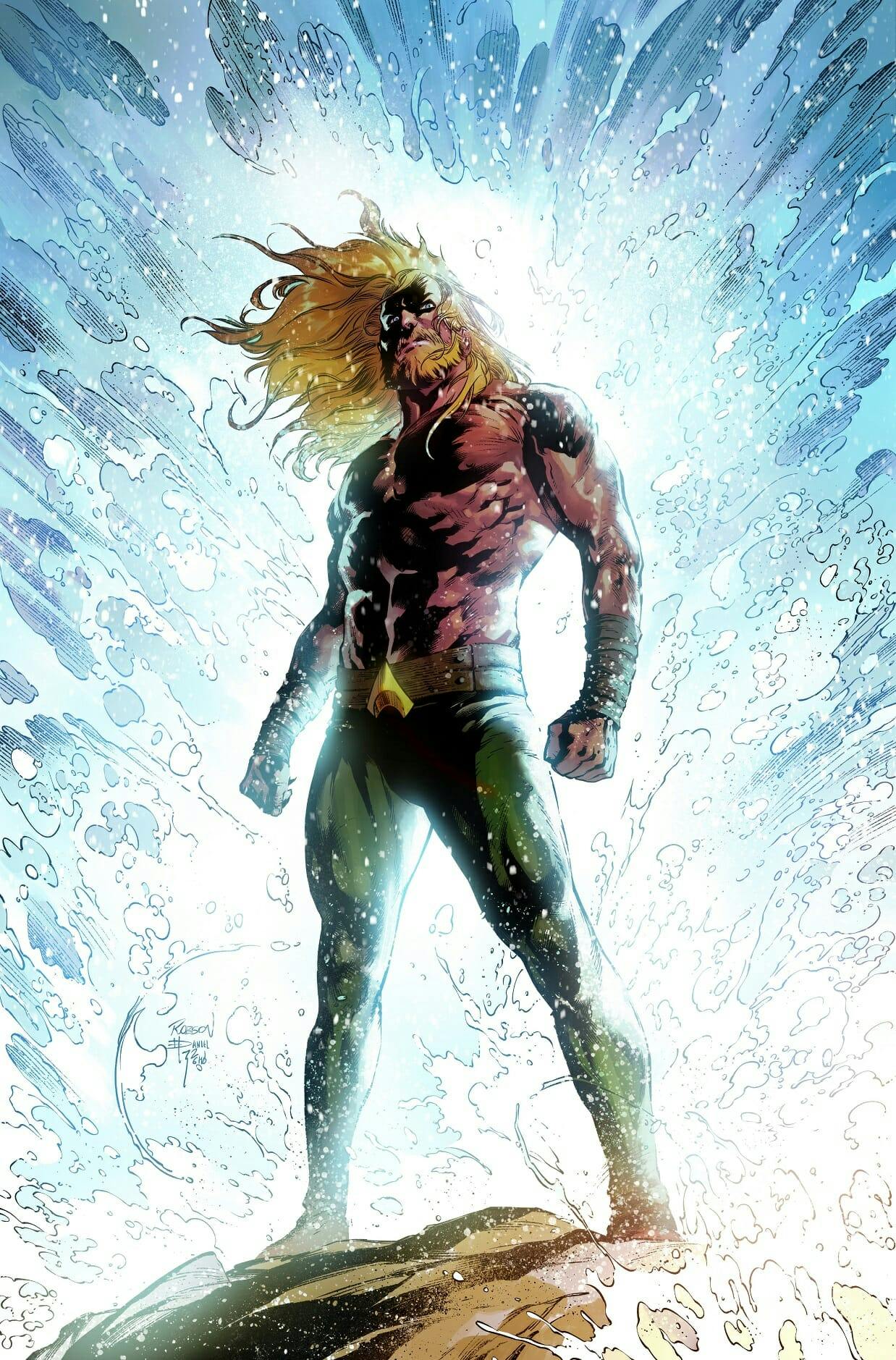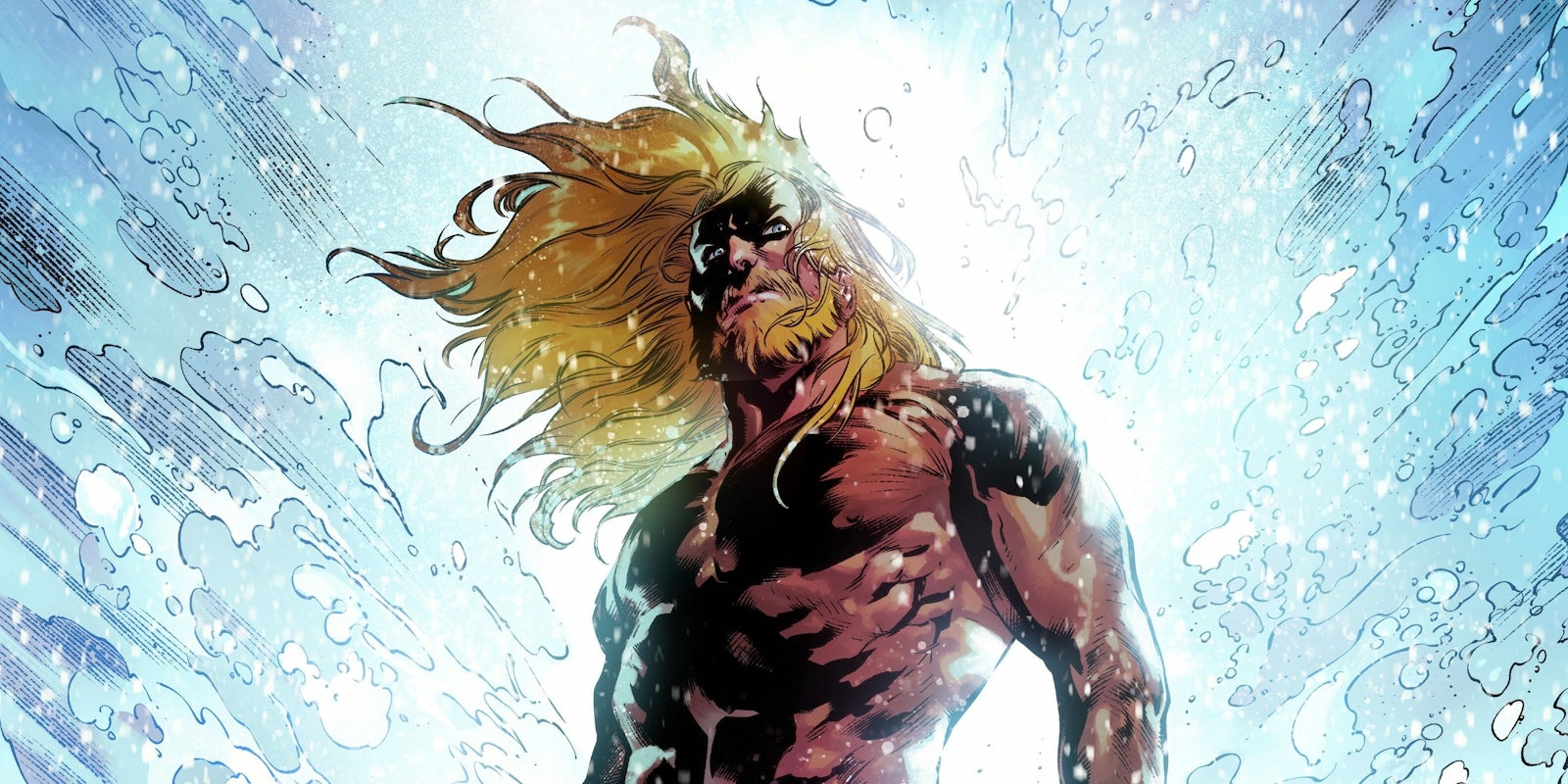Just in time for the new movie, Aquaman‘s comic relaunches with a new story and creative team, writer Kelly Sue DeConnick and artist Robson Rocha. Starting after DC’s recent Drowned Earth crossover event, DeConnick and Rocha take over on issue #43, with a fresh story designed to appeal to several audiences at once: Old-school Aquaman fans, new readers who just watched the movie, and the ever-growing fanbase that followed DeConnick from Captain Marvel to Bitch Planet and beyond.
Rather than being a traditional superhero story, DeConnick compares her Aquaman to Wonder Woman‘s more mythological adventures. It begins with an amnesiac Arthur Curry arriving on the Island of Unspoken Waters, a mysterious location populated by ocean deities. With no memory of his old life, it’s almost a new origin story; a journey of discovery for the audience and for Aquaman himself.
Speaking to DeConnick, we learned more about the comic’s background in international folklore, and how she and Robson Rocha embraced the power of the ocean.

The Daily Dot: When you start a fresh story with a long-established character like this, it’s always kind of a reintroduction for new readers. Which of Arthur Curry’s traits did you want to emphasize with this book?
DeConnick: Because of the particular timing, with the film coming out, you have this understanding that millions of people are going to see this movie. And if those people want to then pick up an Aquaman comic, the film universe portrayal and the comic book portrayal are very different. I want both the established reader who has long loved Aquaman to feel like they recognize their Arthur, and I want the new readers to have some sense of connection to the character as well.
It was important to me to find a way to marry Arthur as we have always known him in the comics to this film portrayal, and the thing that I chose to emphasize—and you have to walk it there, you can’t just make a record-scratch—was sort of… Momoa has a kind of twinkle in his eye, there’s a playfulness, there an orneriness to him that I wanted to pull out of Arthur a little bit. And it makes sense, that joyfulness. Someone who’s so connected to the element of water, which is traditionally life and buoyancy and fluidity, that’s a quality that makes sense in the character.
Yes, it’s definitely more of a sea god vibe than some of the more traditional superhero Aquaman stories. And you’ve compared your version of Aquaman to Wonder Woman, which I found interesting because this first issue has this kind of timeless mythic quality. What kind of research and influences did you have for the ocean myth figures?
As I’ve been working on this book I’ve also been working on Historia for [DC adult comics imprint] Black Label, which is the history of the Amazons from the perspective of the Amazons. So I have been a deep nerd on world myth. Classical Greek myths, absolutely, primarily for the Historia book, but also looking into mythic traditions and classic hero stories cross-culturally. They’re very different books but both books need to feel big and epic.
So are there any particular specific mythological nods that history fans should look out for?
Oh my gosh yes, there’s a whole bunch. Comics have traditionally used myth in our storytelling, but we’ve traditionally focused on Greek and Norse myths because we’re so very Western-based, so I wanted to look at other ocean gods as well. So we have some Aztec gods, we have a Japanese ocean god, we have a Haitian loa, we have a Celtic god, which is still European, but… yeah, we borrowed from a whole lot of world traditions.
It’s something we’ve always done and it’s a thing that you have to be careful with. Like, when are you appropriating and when are you sort of embracing the power of myth, right? So, trying to do it very respectfully and never pretending to be an expert. It’s been a lot of fun and they’re very cool characters, and it’s neat to broaden the world. Oceans cover the globe and so many of our mythic histories have a creation story that begins with the ocean, and in so many of our apocalypse stories, the end of the world is often with a flood. We come to water and we return to water, and that’s sort of core and essential to our psyches.
Regarding the water, it feels like a lot of thought was put into the setting, kind of the equivalent of a book being set in space. How did you take the ocean’s role into consideration?
A couple things. One was that Robson just has this incredible gift for portraying on the page that power and scope of the ocean. So I really wanted to take it into that and try not to crowd him, and to give him big panels where he could really make us feel the mist on our faces, and the power of those waves.
I saw this video the other day, some Vine my kids found or something, that was like people trying to brace windows. There were flood waters coming on, and people standing and bracing against the windows in a restaurant. And then the waters come in and just push them away as though they were nothing. They’re not hurt, I’m not marveling at anyone’s demise or anything, but they’re knocked on their asses. The simple hubris of a human believing, oh, I can stand here and hold back the ocean. Yeah, no. It is gentle and it is sensual and it is powerful and it is cruel. And you are nothing in the face of it. We were really trying to get that on the page as much as we possibly could.
For new readers, how would you describe where Aquaman is emotionally at the beginning of this book?
You know, every comic is somebody’s first comic, so hopefully, if I’ve done my job well, whether you’re a longtime reader of Aquaman or you’ve never heard of the character, you should still be able to pick up this issue and jump right in.
At the start of this issue we’re gonna learn that Aquaman has washed up onto this metaphysical island and he has no memory of who he is or how he got there, so over the course of the first five to seven issues—it’s a five-issue arc and then a two-issue arc—he is learning who he is at the same time that the reader is. It’s a journey of discovery for the established reader where they get to see him find his joy and find his power, and for the new reader we’re gonna walk you through and you’re gonna learn who Arthur Curry is at the same time that Arthur Curry learns who Arthur Curry is.
Aquaman #43 is out on Dec. 19.
